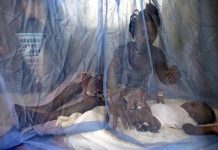Africa-Press – Mozambique. In the town of Chiùre, in the south of Cabo Delgado province, life now changes from day to night, and watching the sun rise on the street is no longer possible with the approach of terrorist attacks in the last week.
On the town’s main avenue, the intense movement of the early hours of the day, with shops and hundreds of vendors along a street that mixes dirt and potholes with vestiges of tar, the hundreds of people shopping or walking under the scorching sun start fading away in the early afternoon.
By 6:00 p.m., as the sun sets, everyone is at home, fearing the night and the terrorist attacks now being registered no more than ten kilometres distant in the district.
At the Mucacata bar counter, at 7:30 p.m., three customers are being served by 45-year-old Alfredo Severiano. They have thirty minutes to finish up and quickly return home along an already deserted avenue.
“At this time, the town would be calm, there were no problems. The problems started this week. At this time it would still be movement,” he explains to Lusa as he prepares to clear the two tables still at the entrance.
In Chiùre, a town of usually around 75,000 inhabitants but now, with those displaced by the terrorist attacks on neighbouring villages last week, home to almost 100,000 people, even though there is no official curfew, everyone knows, that at 8:00 p.m., it is time to stop going outside.
“We are the ones who think that. This is just to avoid problems. At night, you don’t know now if someone is an enemy or not,” explains Severiano, a barista at Mucacata since 1983.
“It was this week that the confusion started,” he adds. Before that, “nothing like this had ever happened”.
Meanwhile, his last customers start to say their goodbyes.
“They already know they have to leave. There’s no way of staying here late into the night, like before,” he says.
Wilson, 28 years old, who sells clothes on Chiùre’s main thoroughfare, is drinking a last soda at the bar.
“Because of terrorism in Cabo Delgado, the situation is not good at all,” he explains, acknowledging that outside “they are already sleeping”, afraid of the night.
“During the day, in the morning and until 3:00 p.m., yes, there are people,” he adds.
Shortly after, just a few minutes before 8:00 p.m., it’s time to go home.
“I’m scared, yes, but I have no nowhere else to go,” Severiano says, before going to check that everything is okay in the ‘barraca’ where he makes a living.
Carimo Manuel, 46 years old, is outside the bar, but, unlike the others, he will stay there. He is Mucacata’s security guard at night and works in the machambas during the day.
Carimo is “very distressed” about the situation, he tells Lusa.
“We don’t know where we can go (…) Let’s wait,” he says, in a tone that combines calm and the apprehension of another night ahead, the new reality of the past week.
He will only leave the bar’s door in the morning. Until then, he can only hope for the best, stationed on an avenue where only a few security guards remain outside.
“I’m scared, but there’s no alternative. We don’t have another job,” he says, about the nights that changed in a few days.
“It was full – now they’re gone. There’s no one left,” he says.
Bahari Ali Cassimo, 36 years old, has been a councilor for Planning, Administration and Finance in the municipality of Chiúre for five years. He is already in his second term, but since the beginning of the terrorist attacks in Cabo Delgado in 2017, the threat has never reached the town’s doors.
“We are insecure (…) It’s very close – about 15 kilometres,” he tells Lusa about this week’s attacks in the village of Mmala, which caused at least seven deaths and the flight of thousands of people to Chiùre.
A teacher from the village, the town councillor reports, was captured by the insurgents and only released in the following days – a scenario that fulling justifies retreating home as soon as the sun sets.
“Actually, it’s insecurity. The insecurity we have. From 5:00 p.m., 6:00 p.m., the townspeople cannot move because of insecurity. These insurgents, from what I heard, now ride motorbikes, so neither taxis nor motorbikes can circulate, because they could be seen as suspicious,” he explains.
In Chiùre town, a 150-kilometre, three-hour journey from provincial capital Pemba on a road constantly under threat of new attacks, everything was different a week ago.
“A lot of movement, a lot of movement. People were playing [all night long] in the street.”
Now, he laments, “there is nothing”, including no revenue for the municipality: “Not even revenue collection. Everything is at a standstill.”
At the Mucacata bar, it’s time for Alfredo Severiano to close the doors and go home quickly. But, even so, he believes that things will get better.
“The village’s joy is diminished, but it hasn’t altogether disappeared. It’s just diminished,” he says.
For More News And Analysis About Mozambique Follow Africa-Press






